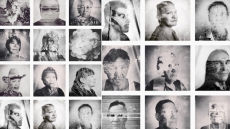ST. JOHN'S, N.L. — The uproar this week over a police inspector's role in an online video endorsing the Newfoundland and Labrador premier is raising questions about rights and acceptable restrictions.
Premier Paul Davis, a former police constable, at first defended the appearance of Insp. Todd Barron. The series of testimonials from supporters — interspersed with cuts of Davis jogging and making phone calls — included Barron describing Davis as a tenacious "normal guy doing an important job."
That portion was swiftly edited out, however, as the video drew media questions and the attention of Royal Newfoundland Constabulary brass.
Davis acknowledged the act governing the force restricts political activity. But he also questioned whether such rules infringe the Charter of Rights and Freedoms.
"I respect people's individual rights to have an opinion, to express that opinion as well," he said Wednesday. "If they have a sworn duty, an obligation to government as an employee and so on, if it doesn't interfere with that then they are well within their rights."
Or are they?
Constitutional lawyer Jamie Merrigan did not wish to comment specifically on the ad for Davis, whose Progressive Conservative government faces an election Nov. 30.
But Merrigan said there's a growing need to clarify the legal boundary between individual rights and expectations of public servants. This is especially so in the social media age as once private political opinions become public at lightning speed, he said in an interview.
"Once upon a time, if you supported a candidate you shook their hand on the doorstep and you might put a sign on your lawn. Now there are 50 different ways that you can express your political view, and figuring out which of those are safe for a public servant and which of those are not is going to be complicated."
Ongoing court cases are only beginning to set out how rights and restrictions should be balanced, Merrigan said.
His advice to clients who might want to push workplace boundaries: "Think very hard before you step outside of or challenge these rules. Get legal advice and make your challenge in an appropriate venue."
Tom Stamatakis, president of the Canadian Police Association, said the knee-jerk reaction to the Davis video suggests wrongdoing where there might be none.
"I think it's extremely unfortunate that we seem to be in an environment where public officials, whether they be police chiefs or government officials, are that reactive or sensitive to a headline," he said in an interview.
"It implies that you've done something wrong, and I'm not sure that's exactly the case."
Stamatakis stressed that police officers must park their own opinions as they go about their jobs.
"You need to serve a diverse range of people with different views and interests, and you have to do that in a way that's impartial and fair," he said. "But at the same time, I think it's also important that police officers do have the right to express an opinion outside of that context."
In fact, police are frequently sought out for all manner of public input, Stamatakis said.
"I think ultimately the overriding consideration should be that we have the Constitution that guarantees the right to be able to freely speak about different issues. It's all about balancing that right against making sure that you don't go too far where it may leave a perception that there is bias."




